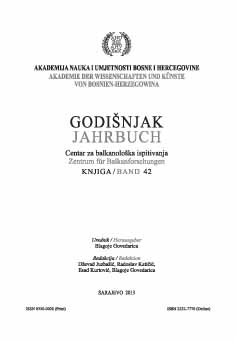Geschichte des Balkanraums als Migrationsgeschichte: Theoretische Überlegungen und Herausforderungen
The History of the Balkans as a History of Migrations: Theoretical Deliberation and Challenges
Author(s): Holm SundhaussenSubject(s): History
Published by: Akademija Nauka i Umjetnosti Bosne i Hercegovine
Summary/Abstract: Migrations have always been an essential part of the history of Europe and the Balkans. Few people realize how many ethnic and religious groups in the Balkans participated in migrations not only during the modern times but also during the ancient, medieval and early modern times. This article focusses on the Ottoman period of Balkan history. Migrations are understood in a broader sense: as migrations from one country to another and as migrations from one culture to another (in form of changing the religion and/or the language and the identity). Both forms of border-crossing were often interrelated: People who converted from Christianity to Islam in the Ottoman provinces had no cause to emigrate und those who emigrated had no cause to change their religion. In many parts of the Islamic Mediterranean world we find converts (“renegades” as they were called by Christians). Most of them changed their religion voluntarily. But it often took one, two or more generations until the converts accepted their new religion wholeheartedly. In the meantime they were regarded as crypto-Christians, who had formally converted to Islam, but practiced Christianity in private life. These crypto-Christians (or Poturi as they were called in Bosnia) were a widespread phenomenon. By changing places or changing cultures (voluntarily or forcibly) new experiences and often new identities were shaped. Balkan history is for a great part a history of movements. But so far, there has been no attempt to systematize the migration of southeastern Europe from the early modern period to the 20th century beyond national-historiographic, nationallinguistic, or microregional approaches. Not even the beginnings of a synthesis of the migratory events are on the horizon. This has to do with the national focus of historical scholarship and the inclination to interpret an ethnic group (the alleged nucleus of a modern nation) as an everlasting, eternal phenomenon. Apart from the fact that there is no consensus how to define an ethnic group we should consider the fact that the composition of ethnic groups has often changed as a result of spatial and cultural migrations. For most people in early modern times ethnicity was an empty category (in contrast to religious affiliation). And the designations used in early modern travel books also resist clear ethnic interpretation (e.g. “Greeks”, “Turks”, “Vlachs”, “Saxons”, “Serbs” etc.).
Journal: Godišnjak Centra za balkanološka ispitivanja
- Issue Year: 2013
- Issue No: 42
- Page Range: 203-213
- Page Count: 11
- Language: German

